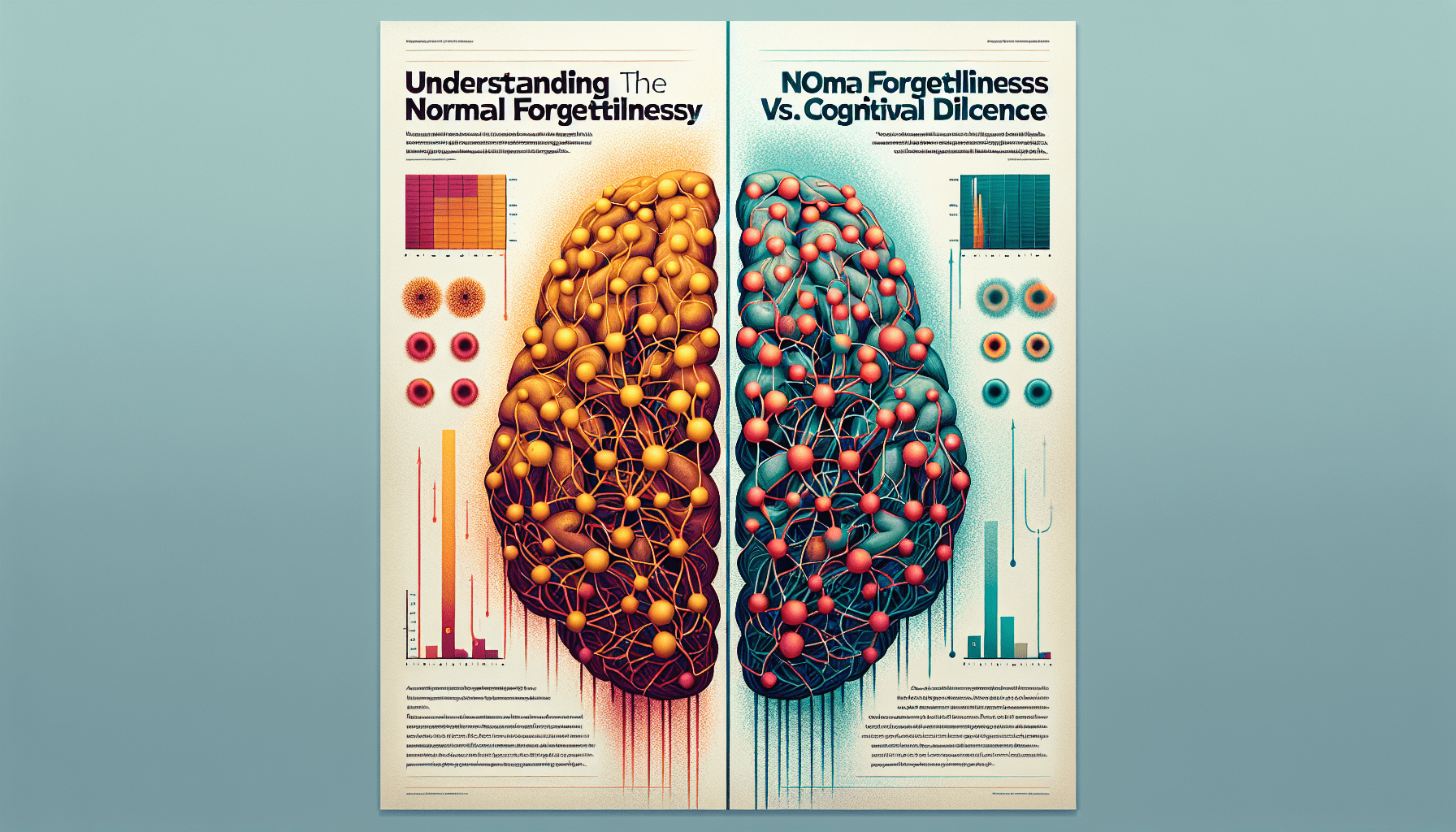Have you found yourself forgetting where you put your keys or struggling to recall a name? It's not uncommon to worry if these instances are merely normal forgetfulness or signs of something more serious. Distinguishing between normal age-related memory lapses and cognitive decline is crucial, not just for peace of mind but also for taking appropriate action when necessary.

What is Normal Forgetfulness?
Normal forgetfulness refers to the everyday memory lapses that everyone experiences at times. These instances are usually minor and don't interfere significantly with daily life. You might misplace your phone, forget an appointment, or struggle to remember a distant relative's name. Such episodes become more frequent as you age but are generally considered a normal part of aging.
Characteristics of Normal Forgetfulness
- Temporary and Infrequent: Occasional lapses occur but don't frequently interrupt daily activities.
- Non-Progressive: These memory problems don't worsen over time.
- Often Related to Attention or Distractions: For example, forgetting why you walked into a room because you were distracted by something else.
- Improvement with Cues: Often, a hint or cue can help you recollect the forgotten information.
Here's a quick reference table:
| Normal Forgetfulness | Characteristics |
|---|---|
| Frequency | Infrequent |
| Progression | Non-progressive |
| Triggers | Distractions, attention lapses |
| Improvement | Often improves with cues or hints |
| Impact on Daily Life | Minimal or none |
Examples of Normal Forgetfulness
- Misplacing items like keys or glasses occasionally.
- Forgetting names of acquaintances but remembering them later.
- Temporarily forgetting appointments or dates, but recalling them eventually.
Understanding Cognitive Decline
Cognitive decline is a more serious issue that involves a noticeable decrease in one's mental functions. This includes memory, reasoning, and other critical thinking skills. Unlike normal forgetfulness, cognitive decline can significantly affect daily life.
Characteristics of Cognitive Decline
- Frequent and Persistent: Memory lapses are more frequent and persistent, and they don't go away.
- Progressive: The condition worsens over time.
- Impact on Daily Life: These lapses significantly hinder daily activities and routines.
- Difficulty in Learning and Retaining New Information: New skills or information are challenging to learn and retain.
- Confusion and Disorientation: This might lead to getting lost in familiar places.
A quick comparison table on cognitive decline features:
| Cognitive Decline | Characteristics |
|---|---|
| Frequency | Frequent and persistent |
| Progression | Progressive |
| Triggers | Often without any noticeable triggers |
| Improvement | Little to no improvement with cues or hints |
| Impact on Daily Life | Significant |
Signs of Cognitive Decline
- Asking the same questions repeatedly.
- Forgetting common words or substituting unusual words.
- Taking longer to complete familiar tasks.
- Misplacing items in inappropriate places (e.g., putting a wallet in the fridge).
Comparing Normal Forgetfulness and Cognitive Decline
At times, it can be tough to decipher whether what you're experiencing is normal forgetfulness or something more concerning. The key lies in the patterns and impacts of these memory problems.
| Aspect | Normal Forgetfulness | Cognitive Decline |
|---|---|---|
| Frequency | Occasional | Frequent |
| Progression | Non-progressive | Progressive |
| Triggers | Often related to distractions or multitasking | Generally without noticeable triggers |
| Assistance with Hints/Cues | Typically helps | Rarely helps |
| Impact on Daily Life | Minimal | Significant |
| Learning New Information | No major issues | Difficult |
| Recollection of Recent Events | Typically good | Poor |
Causes of Normal Forgetfulness
Several factors can contribute to normal forgetfulness, many of which are temporary and manageable.
Stress and Anxiety
High stress levels can distract you, making it hard to focus and recall information.
Sleep Deprivation
Lack of proper sleep impairs your brain's ability to consolidate and recall memories.
Poor Nutrition
A diet lacking essential nutrients, particularly those vital for brain health like omega-3 fatty acids, can affect memory.
Medication Side Effects
Some medications can affect your memory as a side effect. If you've noticed changes after starting a new prescription, consult your healthcare provider.

Causes of Cognitive Decline
The roots of cognitive decline are often more complex and could be due to various serious conditions.
Alzheimer's Disease
The most common cause of cognitive decline in older adults, Alzheimer's affects memory, thinking, and behavior.
Vascular Dementia
Often caused by strokes or other conditions that block or reduce blood flow to the brain, this condition results in significant memory loss and cognitive issues.
Parkinson's Disease
Beyond affecting motor functions, Parkinson's can also cause cognitive decline.
Lewy Body Dementia
Characterized by abnormal protein deposits in the brain, Lewy body dementia impacts thinking, memory, and motor control.
Traumatic Brain Injury (TBI)
Past head injuries, even from many years ago, can lead to cognitive decline later in life.
Chronic Medical Conditions
Diseases like diabetes and hypertension, if poorly managed, can contribute to cognitive decline over time.
Diagnosing Cognitive Decline
If you or a loved one experiences persistent memory issues, consulting a healthcare provider is essential. Diagnosis typically involves a multi-step process to ensure accuracy.
Medical History and Physical Exam
Your healthcare provider will start by reviewing your medical history and conducting a physical exam to rule out other conditions.
Cognitive Tests
Several cognitive tests, like the Mini-Mental State Examination (MMSE) or Montreal Cognitive Assessment (MoCA), help measure cognitive function.
Brain Imaging
Techniques such as MRI or CT scans might be recommended to look for signs of strokes, tumors, or other abnormalities in the brain.
Blood Tests
Blood tests can identify underlying conditions affecting memory, like thyroid issues or vitamin deficiencies.
Neuropsychological Evaluation
A detailed assessment by a neuropsychologist can pinpoint the type and severity of cognitive issues.
Management and Treatment
While normal forgetfulness usually doesn't require treatment, managing or delaying cognitive decline involves specific strategies and medical interventions.
Lifestyle Changes
- Healthy Diet: Eating a balanced diet rich in fruits, vegetables, and omega-3 fatty acids can support brain health.
- Regular Exercise: Physical activity improves blood flow to the brain.
- Mental Stimulation: Engaging in puzzles, reading, and other cognitive activities keeps your brain sharp.
- Quality Sleep: Ensure you get adequate, restful sleep.
Medications
Certain medications can help manage symptoms of cognitive decline. Donepezil, rivastigmine, and galantamine are commonly prescribed for Alzheimer's.
Therapy
- Cognitive Behavioral Therapy (CBT): Can help manage stress, anxiety, and depression, indirectly benefiting cognitive health.
- Occupational Therapy: Aids in adapting your living environment to make daily tasks easier and safer.
Support Systems
Building a support system around you is crucial for managing cognitive decline. Family, friends, and caregiver support can make a significant difference.
Regular Check-Ups
Frequent visits to your healthcare provider help monitor your condition and make necessary adjustments to your treatment plan.
Tips for Boosting Memory
Whether you're dealing with normal forgetfulness or concerned about cognitive decline, certain strategies can help enhance your memory.
Stay Organized
Keeping a structured environment minimizes the chances of losing items or forgetting tasks. Use to-do lists, calendars, and reminders.
Consistent Routine
Maintaining a regular daily routine reduces the cognitive load of remembering what to do next.
Active Social Life
Engaging in social activities stimulates your brain. Conversations, shared experiences, and communal activities are excellent mental exercises.
Learn Something New
Adopting new hobbies, like learning an instrument or a new language, challenges your brain and improves cognitive function.
Mind-Body Practices
Practices like yoga and meditation bring mindfulness, helping you focus and reduce stress, which in turn can improve memory.
| Tip | Description |
|---|---|
| Stay Organized | Use lists, calendars, and a structured environment. |
| Consistent Routine | Reduce cognitive load with a regular daily routine. |
| Active Social Life | Engage in social activities and conversations. |
| Learn Something New | Take on new hobbies to challenge your brain. |
| Mind-Body Practices | Yoga and meditation to improve focus and reduce stress. |

Conclusion
While occasional forgetfulness is a part of life and tends to increase with age, persistent and worsening memory issues warrant a more in-depth look. Understanding the differences between normal forgetfulness and cognitive decline is the first step towards maintaining a healthy mind. Taking proactive measures, seeking timely medical advice, and making lifestyle changes can go a long way in preserving cognitive function and improving quality of life.
By being informed and vigilant, you can better navigate the complexities of memory and cognitive health, ensuring you take appropriate actions if necessary. Always remember, early detection and intervention are key when it comes to cognitive decline.
If you ever find these memory issues concerning or feel they are impacting your daily life, don't hesitate to consult a healthcare provider for a thorough evaluation.

